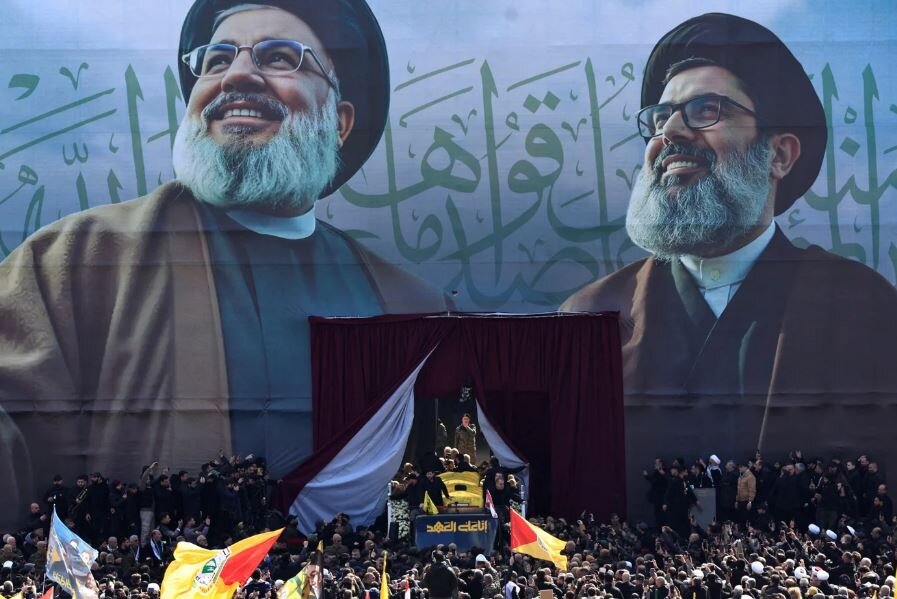Hezbollah leaders’ funeral: a message of unyielding determination and resistance

TEHRAN – On February 23, 2025, Lebanon's capital, Beirut, witnessed a historic event—the funeral procession of two great martyrs, Sayed Hassan Nasrallah and Sayyed Hashem Safi al-Din. Hundreds of thousands of people from various parts of Lebanon and neighboring countries gathered to express their grief and loyalty to the path of Resistance.
Leader of the Islamic Revolution, Ayatollah Seyyed Ali Khamenei, issued a statement in which he referred to the martyrdom of Sayyed Hassan Nasrallah and praised his role as a great leader and a symbol of Resistance. In his statement, he emphasized the continuation of the Resistance path until ultimate victory is achieved. He stated:
"The martyrdom of the two great commanders, Hassan Nasrallah and Hashem Safi al-Din, does not mark the end of the Resistance path, but rather the beginning of a new chapter of determination and steadfastness. The blood of the martyrs strengthens the power of Resistance and solidifies the resolve of nations in confronting challenges. The Resistance in Lebanon and Palestine has proven that it is not merely a choice but a destiny, and the struggle against global arrogance will only end with the achievement of a final victory,” he said, adding that Iran, along with all the free people of the world, will continue to support the Resistance until both land and humanity are liberated.
The speech has a few implications including:
Continuation of Resistance
Ayatollah Khamenei's speech underscores that martyrdom fuels the determination to continue the struggle. He considers the blood of martyrs as the driving force in the fight against occupiers.
Unifying efforts
The speech calls for unity among all Resistance forces in the region, emphasizing that the path of Resistance is not exclusive to a specific group. This reinforces cooperation between Hezbollah, Hamas, and Islamic Jihad.
Confronting Global Arrogance
Ayatollah Khamenei highlights that the Islamic Republic has incorporated resistance into its foreign policy, particularly in opposition to what he describes as "global arrogance" led by the United States and the Zionist regime.
Message of international support
The reference to Iran's role in backing resistance forces underscores Iran’s central position in regional alliances against Western and Zionist dominance.
Also, during the funeral, Sheikh Naim Qassem, Deputy Secretary-General of Hezbollah, delivered a speech emphasizing the need to uphold the path of the martyrs and continue the resistance. He stated that the blood of the martyrs would further strengthen the resolve of the fighters in confronting the occupiers.
Hamas and Islamic Jihad issued statements expressing condolences for the martyrdom of Sayyed Hassan Nasrallah and his companions, praising their role in supporting the Palestinian cause and Resistance. Both groups reaffirmed their commitment to continued cooperation and coordination with Hezbollah in confronting Israeli occupation.
The funeral ceremony received widespread media coverage, with 79 countries broadcasting the event. Reports indicated that hundreds of thousands of people gathered in the streets of Beirut, expressing their grief and anger, particularly as Israeli aircraft flew over the procession, prompting anti-Israel chants from the crowd.
During the funeral, Israeli warplanes flew over Beirut in an attempt to provoke the crowd and assert dominance. However, this move was met with defiance, as attendees reaffirmed their commitment to resilience in the face of any threat.
A clear message
The funeral procession demonstrated the unity of ranks and the broad popular support for the choice of Resistance, sending a clear message to the enemy that targeting leaders would not deter the people from continuing their struggle. The event also highlighted the internal cohesion of the Resistance front and its readiness to face future challenges with high morale.
In conclusion, the martyrdom of these leaders marks a turning point in the history of Resistance, reinforcing the determination of nations to achieve their legitimate goals and affirming that the struggle will persist until the land is liberated and rights are restored.
Leave a Comment